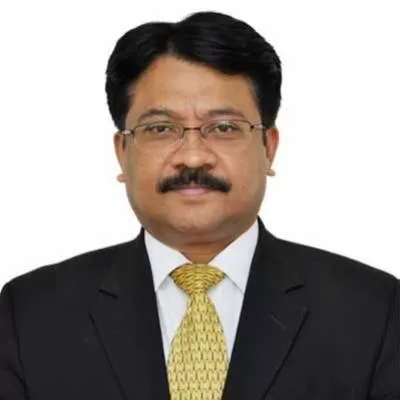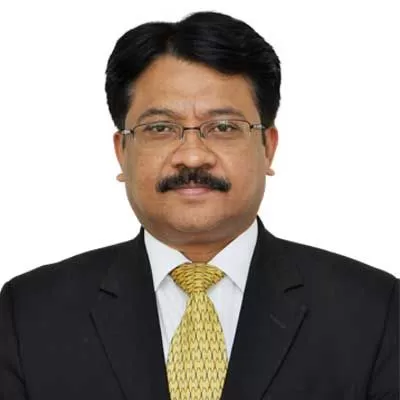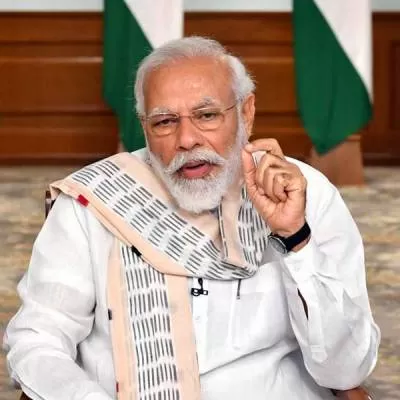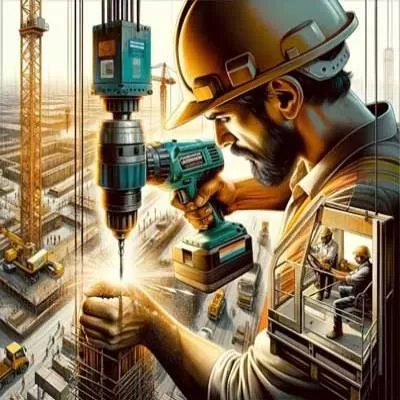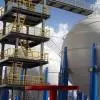- Home
- Infrastructure Urban
- ECONOMY & POLICY
- My dream is to reach Rs 5,000 crore in another four to five years
My dream is to reach Rs 5,000 crore in another four to five years
He's a firm believer of destiny. What's more, Jagdishkumar M Gupta, Chairman and Managing Director, J Kumar Infraprojects Ltd, believes in making his own. Beginning his career in 1964 as a supervisor in a construction company with a monthly income of Rs 400, he took a loan of Rs 20,000 and formed his own company; today, it is crossing a turnover of Rs 1,000 crore. Gupta shares the company's incredible journey in conversation with Shriyal Sethumadhavan.
Over 30 years in the infrastructure business is a long time. What inspired you to choose this path?
When I came to Mumbai in 1964, I least imagined that I would form this company. Till 1979, I worked with a construction company and then started J Kumar Infraprojects. The foundation of the business was laid by setting up a proprietorship concern under the name of J Kumar & Co in 1980. Initially, we maintained Public Works Department (PWD) buildings and scaled up to get registered with the PWD, Government of Maharashtra, as a Class I-A civil contractor. From here, we started executing civil contracts for government, semi-government, and various private organisations relating to infrastructure and civil engineering construction contracts comprising roads, flyovers, bridges, irrigation projects, commercial buildings, railway buildings, sports complexes and airport contracts up to 2004.
With a vision to expand the business, become a professionally driven company and reap the benefits of a corporate entity, we incorporated a company on December 2, 1999, by the name of J Kumar & Company (India) Pvt Ltd under the Companies Act, 1956, and then subsequently converted to a public company in 2007 by coming out with the public issue. We started with Mumbai, further expanding to the rest of Maharashtra; we are currently building several bridges all over India. We are also executing metro and mono rail projects for Mumbai and Delhi, besides several irrigation dams, roads, highways of concrete roads, airport runways, etc. You asked me what inspired me! I don't know: the paths were formed and I kept working all along.
You execute projects for government as well as private organisations. Is the experience different?
There is a difference in each of these spheres. In case of government projects, if you offer quality work and behave well, you are in the good books of all officers and bureaucrats. And most important, in government contracts, the payment is 99 per cent cleared unlike in the case of private firms where you never receive 100 per cent payment. Every time an agreement is signed, they point flaws and in the process eat up almost 10 per cent of the payment. However, at present, 95 per cent of our works are for the government; that's the reason the company has never been in bad debt.
Tell us about one landmark project that pushed you to the peak of your career.
It's not just one project. For instance, in 1992, we pitched for five foundations for piling. Prior to that, we were not recognised in the piling division, but today we rank second in India. We have 26 piling rigs worth Rs 100 crore in one unit only. We had initially also formed a JV for the construction of two flyover projects in Mumbai. However, after that, we only preferred a JV for big projects – anywhere between Rs 500 crore and Rs 1,000 crore – and eventually hope to work independently for all projects in the future.
Apart from these, the major growth for the company started after constructing the Mumbai-Pune road. Our various other landmark projects include the construction of a flyover bridge at Konkan Bhavan (CBD) Junction, Eastern Express Highway and CMLR at Cheddanagar, Kalyan Naka Junction to new ST Stand in Bhiwandi within the stipulated time. We have also executed the construction of a flyover, slip roads and allied works at Seven Hills Chowk on the Aurangabad-Jalna road, and pedestrian subway at Rajaramnagar by a box pushing method near Santacruz on the Western Express Highway, Mumbai, before the stipulated time; we have been awarded a bonus for early completion of the project.
How do you ensure quality and timely completion of every project?
This is part of our mission statement. We ensure minimal time and cost-overruns. Our cost overruns have systematically declined over the years, not only in absolute terms but as a percentage of project cost, thanks to our excellent project planning department and technological advancements. There are two prime reasons for this success. One is that we never take machines on rent. So we are not dependent on any source for machines. Our machines include 26 piling rigs, cranes, bulldozers, etc. Also, if we have our own machines, our expenses are reduced and we can also make timely deliveries. Secondly, we ensure the wellness of our employees. Majority of our employees have been with us for years, which again is an added advantage.
Would you like to highlight any recent orders along with the scope of work?
We have recently bagged the Sion-Panvel project in Mumbai, estimated at about Rs 500 crore, and another 40 acre project in Alwar, Rajasthan, estimated at about Rs 550 crore. The Alwar project is being executed for the Central Government. It is a single construction of 36 lakh sq ft on the compound. The Sion-Panvel project is a road/flyover project similar to the Mumbai-Pune expressway with no signals. Construction work has begun on both projects and is expected to be completed in the next two to three years.
Any technological advancements here?
For the Sion-Panvel road, we are using one of the latest concrete pavers, imported from Germany for concrete roads. Used for the first time in India, this paver automatically makes cement roads speedily. It consumes about 5,000 bags per day of cement and requires only three people as against 200 people required by conventional means.
According to you, what gives you an edge over your competitors?
In terms of management style and functioning, each company has a unique identity. However, we are different from the rest in at least two ways. Firstly, we do not depend on an external source for anything. We own our machines and none of them are on lease. This gives us much required leverage. Planning and design are also done in-house. Second, we generally keep ourselves away from sub-contracting, unlike others.
Contractors are often accused for not adhering to the quality requirements of roads, especially in Mumbai. Your reaction to this?
It would be wrong to blame contractors alone, there are also various government departments involved in the process. Once the project is awarded, contractors will try to avoid time and cost overruns. And after all this, if contractors fail to maintain quality, will the government award contracts to the same contactors again? No. We are contractors and not fly-by-night operators; we are here to do business and get recognition.
Any plans to expand your geographic horizons?
With our base in Maharashtra, we were state-centric earlier. But now, we have not left any corner untouched in India. With ongoing projects in Rajasthan, Delhi, and Gujarat, we have bid for projects in Kolkata, Bengaluru, Madhya Pradesh, Uttar Pradesh, Haryana, etc. We have up to Rs 10,000 crore worth of tenders still in the process. There are opportunities outside India as well. We do have tie-ups with China Railways, the Russian Government, Malaysia, etc. But with so much work in India at present, we do not feel the need to expand overseas.
How would you comment on the issue of land acquisition?
Land acquisition is one main factor that delays the implementation of National Highway Development Projects (NHDP). There are times when a two-year project takes five years to complete. Of the 226 projects under implementation by NHAI, about 58 projects are delayed owing to various reasons, the prime one being land acquisition.
With the 2012 Budget around the corner, how can the government aid the process of growth in your industry?
The government can aid growth by allowing private players and FDI to complement the requirement of the liquidity crunch. The industry is looking for a robust framework with transparent policies for project execution and leverage funding sources will be critical to keep up the pace of the infrastructure industry in India.
Tell us about the company's performance in FY2011. Any expectations, plans and strategies for the next fiscal? Our recent Q3 results indicate our growth by 35 per cent at Rs 2,507 million. For the same quarter, our EBIDTA and net profit grew by 24 per cent at Rs 408 million and by 35 per cent at Rs 196 million respectively. Looking forward, in 2012 we expect a minimum growth of 25 per cent. As part of our expansion plans, we are gearing up to enter new fields, one of which is tunnelling. My dream for J Kumar Infraprojects is to reach Rs 5,000 crore in another five years.
Fact sheet
Year of establishment:1980
Top management: (promoters): Jagdishkumar M Gupta, Chairman and Managing Director; Executive Directors - Nalin
J Gupta, Kamal J Gupta; Independent Directors - R Srinivasan, Ashwani Kumar, Padmanabh P Vora, Roshankhan H Tadvi
No. of employees: 1,000 + Centre of operation: Mumbai
Upcoming projects: Flyover from College of Engineering, Pune, to Patil Estate; flyover on Pune-Satara Road at Dhankawdi; supply of RMC to Suzlon Gujarat Wind Plant Ltd; building in Rajasthan from Uttar Pradesh Rajkiya Nirman Nigam Ltd; Sion-Panvel Special State Highway project, construction of viaduct and two elevated stations for Delhi MRTS phase-III; work orders from CIDCO and Pune Municipal Corporation
Turnover: Rs 949.19 crore (FY11)
Current order book: Rs 2,531 crore
Jagdishkumar M Gupta, Chairman and Managing Director, J Kumar Infraprojects LtdHe's a firm believer of destiny. What's more, Jagdishkumar M Gupta, Chairman and Managing Director, J Kumar Infraprojects Ltd, believes in making his own. Beginning his career in 1964 as a supervisor in a construction company with a monthly income of Rs 400, he took a loan of Rs 20,000 and formed his own company; today, it is crossing a turnover of Rs 1,000 crore. Gupta shares the company's incredible journey in conversation with Shriyal Sethumadhavan.Over 30 years in the infrastructure business is a long time. What inspired you to choose this path?When I came to Mumbai in 1964, I least imagined that I would form this company. Till 1979, I worked with a construction company and then started J Kumar Infraprojects. The foundation of the business was laid by setting up a proprietorship concern under the name of J Kumar & Co in 1980. Initially, we maintained Public Works Department (PWD) buildings and scaled up to get registered with the PWD, Government of Maharashtra, as a Class I-A civil contractor. From here, we started executing civil contracts for government, semi-government, and various private organisations relating to infrastructure and civil engineering construction contracts comprising roads, flyovers, bridges, irrigation projects, commercial buildings, railway buildings, sports complexes and airport contracts up to 2004.With a vision to expand the business, become a professionally driven company and reap the benefits of a corporate entity, we incorporated a company on December 2, 1999, by the name of J Kumar & Company (India) Pvt Ltd under the Companies Act, 1956, and then subsequently converted to a public company in 2007 by coming out with the public issue. We started with Mumbai, further expanding to the rest of Maharashtra; we are currently building several bridges all over India. We are also executing metro and mono rail projects for Mumbai and Delhi, besides several irrigation dams, roads, highways of concrete roads, airport runways, etc. You asked me what inspired me! I don't know: the paths were formed and I kept working all along.You execute projects for government as well as private organisations. Is the experience different?There is a difference in each of these spheres. In case of government projects, if you offer quality work and behave well, you are in the good books of all officers and bureaucrats. And most important, in government contracts, the payment is 99 per cent cleared unlike in the case of private firms where you never receive 100 per cent payment. Every time an agreement is signed, they point flaws and in the process eat up almost 10 per cent of the payment. However, at present, 95 per cent of our works are for the government; that's the reason the company has never been in bad debt.Tell us about one landmark project that pushed you to the peak of your career.It's not just one project. For instance, in 1992, we pitched for five foundations for piling. Prior to that, we were not recognised in the piling division, but today we rank second in India. We have 26 piling rigs worth Rs 100 crore in one unit only. We had initially also formed a JV for the construction of two flyover projects in Mumbai. However, after that, we only preferred a JV for big projects – anywhere between Rs 500 crore and Rs 1,000 crore – and eventually hope to work independently for all projects in the future.Apart from these, the major growth for the company started after constructing the Mumbai-Pune road. Our various other landmark projects include the construction of a flyover bridge at Konkan Bhavan (CBD) Junction, Eastern Express Highway and CMLR at Cheddanagar, Kalyan Naka Junction to new ST Stand in Bhiwandi within the stipulated time. We have also executed the construction of a flyover, slip roads and allied works at Seven Hills Chowk on the Aurangabad-Jalna road, and pedestrian subway at Rajaramnagar by a box pushing method near Santacruz on the Western Express Highway, Mumbai, before the stipulated time; we have been awarded a bonus for early completion of the project.How do you ensure quality and timely completion of every project?This is part of our mission statement. We ensure minimal time and cost-overruns. Our cost overruns have systematically declined over the years, not only in absolute terms but as a percentage of project cost, thanks to our excellent project planning department and technological advancements. There are two prime reasons for this success. One is that we never take machines on rent. So we are not dependent on any source for machines. Our machines include 26 piling rigs, cranes, bulldozers, etc. Also, if we have our own machines, our expenses are reduced and we can also make timely deliveries. Secondly, we ensure the wellness of our employees. Majority of our employees have been with us for years, which again is an added advantage.Would you like to highlight any recent orders along with the scope of work?We have recently bagged the Sion-Panvel project in Mumbai, estimated at about Rs 500 crore, and another 40 acre project in Alwar, Rajasthan, estimated at about Rs 550 crore. The Alwar project is being executed for the Central Government. It is a single construction of 36 lakh sq ft on the compound. The Sion-Panvel project is a road/flyover project similar to the Mumbai-Pune expressway with no signals. Construction work has begun on both projects and is expected to be completed in the next two to three years.Any technological advancements here?For the Sion-Panvel road, we are using one of the latest concrete pavers, imported from Germany for concrete roads. Used for the first time in India, this paver automatically makes cement roads speedily. It consumes about 5,000 bags per day of cement and requires only three people as against 200 people required by conventional means.According to you, what gives you an edge over your competitors?In terms of management style and functioning, each company has a unique identity. However, we are different from the rest in at least two ways. Firstly, we do not depend on an external source for anything. We own our machines and none of them are on lease. This gives us much required leverage. Planning and design are also done in-house. Second, we generally keep ourselves away from sub-contracting, unlike others.Contractors are often accused for not adhering to the quality requirements of roads, especially in Mumbai. Your reaction to this?It would be wrong to blame contractors alone, there are also various government departments involved in the process. Once the project is awarded, contractors will try to avoid time and cost overruns. And after all this, if contractors fail to maintain quality, will the government award contracts to the same contactors again? No. We are contractors and not fly-by-night operators; we are here to do business and get recognition.Any plans to expand your geographic horizons?With our base in Maharashtra, we were state-centric earlier. But now, we have not left any corner untouched in India. With ongoing projects in Rajasthan, Delhi, and Gujarat, we have bid for projects in Kolkata, Bengaluru, Madhya Pradesh, Uttar Pradesh, Haryana, etc. We have up to Rs 10,000 crore worth of tenders still in the process. There are opportunities outside India as well. We do have tie-ups with China Railways, the Russian Government, Malaysia, etc. But with so much work in India at present, we do not feel the need to expand overseas.How would you comment on the issue of land acquisition?Land acquisition is one main factor that delays the implementation of National Highway Development Projects (NHDP). There are times when a two-year project takes five years to complete. Of the 226 projects under implementation by NHAI, about 58 projects are delayed owing to various reasons, the prime one being land acquisition.With the 2012 Budget around the corner, how can the government aid the process of growth in your industry?The government can aid growth by allowing private players and FDI to complement the requirement of the liquidity crunch. The industry is looking for a robust framework with transparent policies for project execution and leverage funding sources will be critical to keep up the pace of the infrastructure industry in India.Tell us about the company's performance in FY2011. Any expectations, plans and strategies for the next fiscal? Our recent Q3 results indicate our growth by 35 per cent at Rs 2,507 million. For the same quarter, our EBIDTA and net profit grew by 24 per cent at Rs 408 million and by 35 per cent at Rs 196 million respectively. Looking forward, in 2012 we expect a minimum growth of 25 per cent. As part of our expansion plans, we are gearing up to enter new fields, one of which is tunnelling. My dream for J Kumar Infraprojects is to reach Rs 5,000 crore in another five years.Fact sheetYear of establishment:1980Top management: (promoters): Jagdishkumar M Gupta, Chairman and Managing Director; Executive Directors - Nalin J Gupta, Kamal J Gupta; Independent Directors - R Srinivasan, Ashwani Kumar, Padmanabh P Vora, Roshankhan H TadviNo. of employees: 1,000 + Centre of operation: MumbaiUpcoming projects: Flyover from College of Engineering, Pune, to Patil Estate; flyover on Pune-Satara Road at Dhankawdi; supply of RMC to Suzlon Gujarat Wind Plant Ltd; building in Rajasthan from Uttar Pradesh Rajkiya Nirman Nigam Ltd; Sion-Panvel Special State Highway project, construction of viaduct and two elevated stations for Delhi MRTS phase-III; work orders from CIDCO and Pune Municipal CorporationTurnover: Rs 949.19 crore (FY11)Current order book: Rs 2,531 crore


